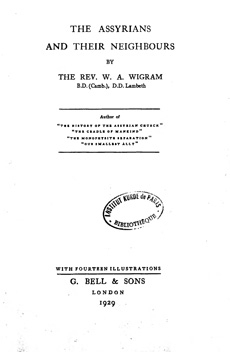|
SYNOPSIS
Chapter I
National Stocks in Mesopotamia
Mesopotamia, the land of the two rivers; irrigable delta. Capital of land at head of delta. Seleucia. Babylon. Baghdad. Hearth of ancient civilization. Permanence of types and customs, e.g. boats, houses. Series of immigrations and conquests, from Accad to Ottoman. Subject, story of one such stock, viz. the Assyrian. These there almost ab initio, spreading to the North. Abraham. Assyrian Empire and its Captivity system. The Israelites. On fall of Empire Assyrian stock remains in old home.
Other types around. Karduchi of Xenophon; Aryan in race and language; a strong but backward type. Home in Taurus mountains forbids union and keeps them always in tribal state. As Sunni Mahommedans, loyal to Khalif, provided orders not enforced. Difficulties of the new regime.
Armenians. Dwellers on tableland; a buffer and commercial State. Never strong enough to be really independent. Important under Mithridates, and as buffer between Rome and Persia, or between Constantinople and Seljuk Turks. Bagratid royal house. Their fall to the Turk. Lesser Armenia and Crusades.
Minor Types. Yezidi and Sabaean, etc.
Waves of temporary conquest in the land. Persians under Achaemenid and Sassanid dynasties. Greeks under Alexander. Romans. Mongols, Ottomans. Arabs of desert for ever coming in and staying. Cause of immigration, gradual desiccation of Arabia. Evidence of and cause of this process. Effect, steady immigration and break-up of tribes.
Occasional invasion in force instead of immigration. Accadians in primitive days. Armies of Islam in eighth century. Modern Wahabis.
Country now Arab. Amalgamation between them and other stocks complicated by existence of Islam.
CHAPTER II
The Parthian Period / 15
Alexander breaks up the old empires, Persia being already decadent. Brings in Western culture to the East, and founds a new epoch. Had he lived, might have realized his dream, and united East and West. Premature death at thirty-two, when ruling from Hellas to India. Still unforgotten, and in a class apart.
Successors, adventurers only. One founds a dynasty (Ptolemy in Egypt), others rule in East and leave nothing. House of Seleucus leaves only name of Kirkuk.
Time of confusion and movement of nations after Alexander, e.g. the coming of Gauls into Greece and Anatolia.
Parthians displace Seleucids. Turanians (i.e. Turks), from Caspian. Rule over Persia and Mesopotamia. Eastwards in touch with China. To West, small kingdoms, Pergamus, Pontus, Armenia. History of the Armenians. Rome behind all, victorious over Carthage and expanding to East. Rivalry of Rome with Parthia and Persia the main fact of next 800 years of long duel between East and West. Conditions then changed by rise of Islam.
Small kingdoms soon go down. Career of Mithridates. Mithraism. Rome and Parthia left face to face. Long rivalry and series of Roman defeats. Crassus, Mark Antony, Trajan.
.....
| 